Two sisters. Two American desires. Two very totally different outcomes.
Maria Del Pilar Barradas-Medel and her older sister Maria Del Consuelo emigrated from Mexico almost three many years in the past. They needed, kind of, a greater life for themselves and the households they hoped for. They needed colleges and jobs — the place they may make greater than $5 a day — and an finish to every day struggles of their dwelling on the outskirts of Mexico Metropolis.
Maria Del Consuelo would final only some months in Southern California, pressured again dwelling to care for his or her ailing new child sister — baby No. 10 of their poor, sprawling household.
Barradas-Medel stayed within the Los Angeles suburbs along with her husband, Alejandro Medel. She is glad she did. Maria Del Consuelo needs she may have too.

Maria Del Pilar Barradas-Medel works as a file clerk in a regulation agency, a job she says she couldn’t have obtained had she stayed in Mexico.
(Irfan Khan / Los Angeles Occasions)
Right here, Barradas-Medel labored her approach up from nanny to cleansing girl to file clerk in a regulation agency. Right here, her husband went from washing vehicles to beginning his personal landscaping enterprise. Right here, her youngsters far surpassed her personal training, graduating from highschool and pursuing extra superior levels.
Barradas-Medel’s wage is humble, and the household of 5 has to squeeze right into a one-bedroom cellular dwelling in Azusa. However it’s a greater life than she may have imagined again dwelling. And it has allowed her to assist her prolonged household in Valle de Chalco.
“I’d do it once more,” she stated of her trek north half a lifetime in the past. “Undoubtedly.”
Immigrants to the U.S. face intensive challenges, together with widespread discrimination and financial hardships. Many report struggles of their every day lives. Nonetheless, Barradas-Medel’s emphatic sure speaks for a big majority of immigrants surveyed earlier this 12 months in a groundbreaking nationwide ballot carried out by The Occasions in partnership with the nonprofit KFF, previously generally known as the Kaiser Household Basis.
The ballot, carried out in 10 languages utilizing a rigorously developed survey methodology, was designed to fill important gaps in what’s identified in regards to the roughly 1 in 6 U.S. adults who have been born in different nations. Its dimension and comprehensiveness enable comparisons amongst immigrants of various nationwide origins and amongst assorted places within the U.S. that have been beforehand unavailable.
That is the primary of many tales The Occasions plans to publish primarily based on the survey’s main findings.
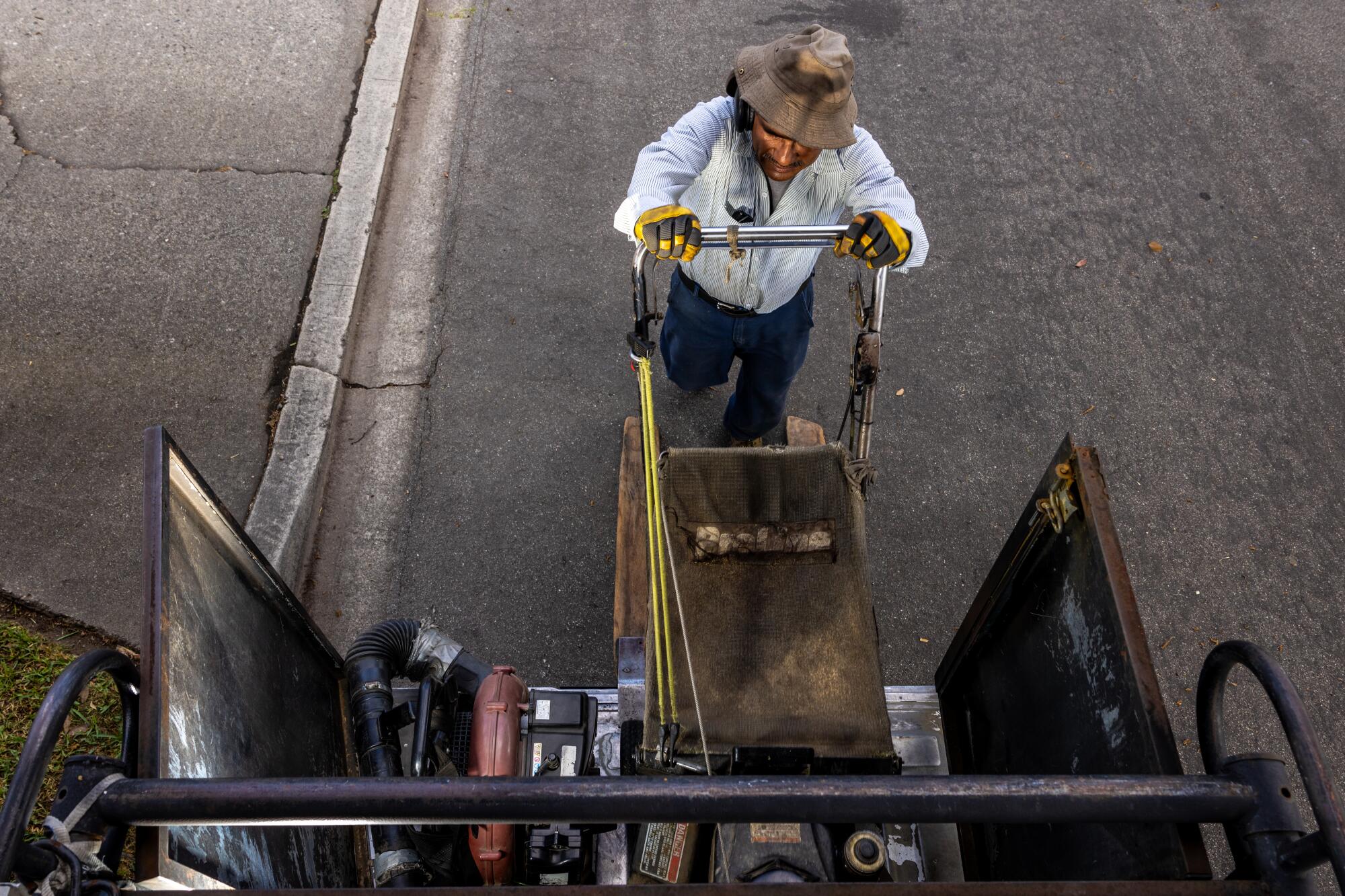
Alejandro Medel went from washing vehicles to beginning his personal landscaping enterprise after coming to the U.S.
(Irfan Khan / Los Angeles Occasions)
Like Barradas-Medel, who was among the many ballot respondents who agreed to follow-up interviews, the overwhelming majority of immigrants say they got here to the U.S. looking for higher financial and job alternatives and a greater future for themselves and their youngsters.
Most say they’ve discovered each.
Eight in 10 immigrants surveyed stated their monetary state of affairs was higher due to transferring to the U.S., and roughly eight in 10 stated instructional alternatives for themselves or their youngsters have improved due to immigrating.
Eight in 10 additionally stated if they may return in time and do all of it once more, they’d nonetheless select to to migrate.
And seven in 10 who’re mother and father stated they count on that their youngsters’s way of life will exceed their very own.
That type of optimism was as soon as thought of an American hallmark, remarked on by commentators going again so far as the early 19th century.
In current many years, although, that’s modified. Students and pollsters have charted a hanging rise in nationwide pessimism. The shift has been pushed primarily by white Individuals, who’ve grown extra gloomy in most years since 2000, apart from an uptick throughout the Trump presidency, based on information from the annual Normal Social Survey, a number one academic-based ballot, analyzed by NORC on the College of Chicago.
Belief in American establishments has additionally dropped, hitting traditionally low ranges among the many inhabitants as a complete, based on polls by Gallup and others.
Amongst immigrants, in contrast, massive majorities report no less than a good quantity of belief in native colleges, police and state and federal governments, the KFF/L.A. Occasions survey reveals.
On each these measures — optimism and social belief — immigrants are upholding attitudes as soon as broadly seen as central to the American creed.
Immigrants give many causes for coming to the U.S., however by a considerable margin, the highest two are to acquire higher alternatives for themselves and a greater future for his or her youngsters.
1

2
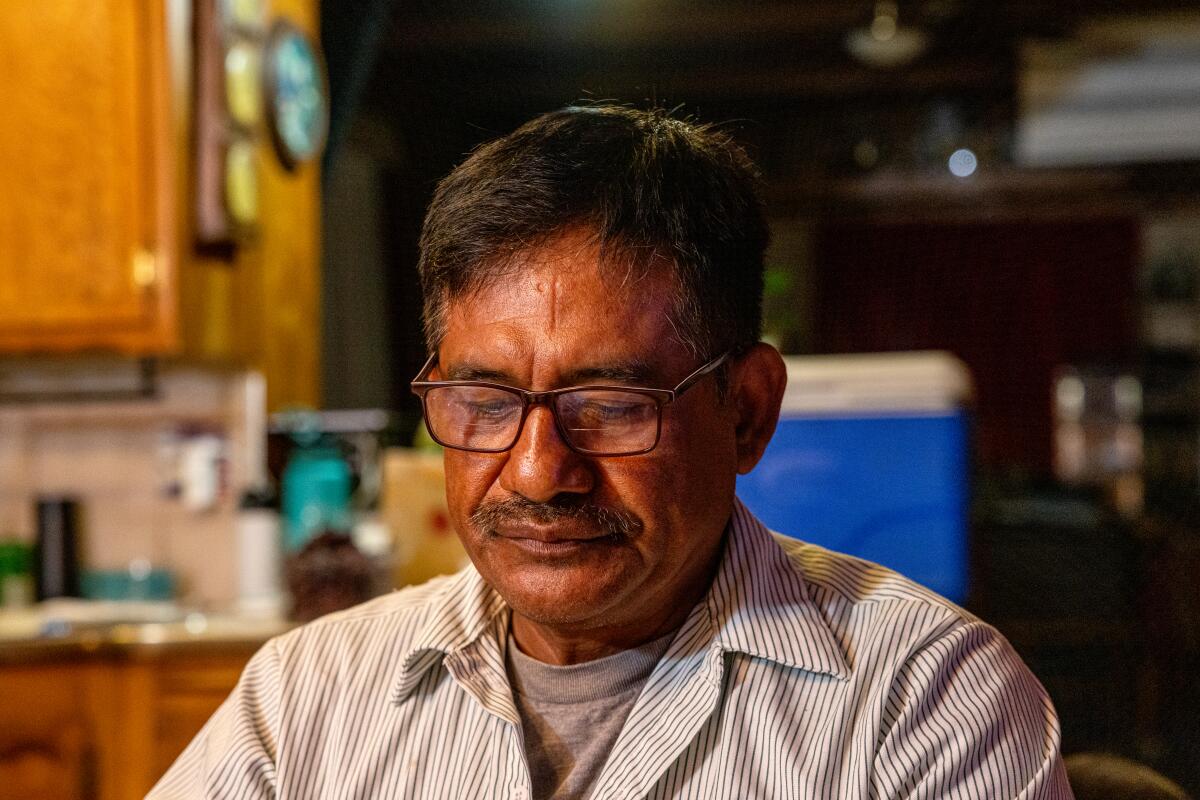
3
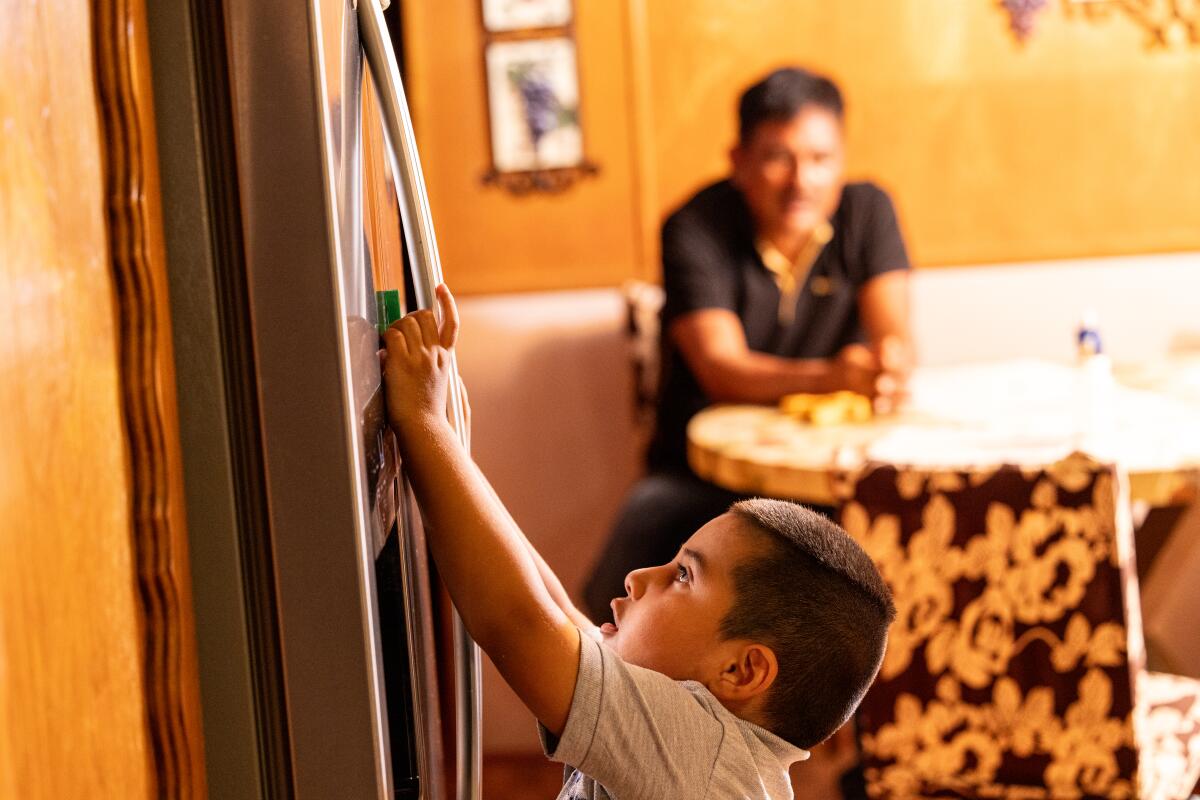
1. Maria Del Pilar Barradas-Medel has her morning espresso earlier than heading to her job. (Irfan Khan / Los Angeles Occasions) 2. Alejandro Medel prepares breakfast for his household at their Azusa dwelling, one thing he does daily. (Irfan Khan / Los Angeles Occasions) 3. Alejandro Medel together with his 4-year-old son, Anxelo, at their dwelling. (Irfan Khan / Los Angeles Occasions)
Immigrants surveyed additionally cited higher rights and freedoms this nation affords and the necessity to get away from unsafe or violent circumstances of their homelands. Escaping unsafe circumstances was cited as a significant purpose by half of those that have neither citizenship nor a inexperienced card and 6 in 10 of these from Central America.
The immigrants interviewed by The Occasions held a variety of standing underneath U.S. regulation. Some obtained citizenship via members of the family, others have been winding via the asylum course of or on non permanent visas. Others have been residing within the nation with out authorized authorization, in some circumstances for a few years. Those that lacked authorized standing talked of shedding jobs due to it and fearing deportation.
Immigrants residing within the U.S. with out authorized standing are considerably extra prone to report financial difficulties and discrimination of their workplaces.
Fabio Gutierrez, 28, arrived in L.A. almost two years in the past, fleeing political persecution in Nicaragua.
“Folks have been dying, disappearing,” he recalled. “Issues acquired actually dangerous … life is simpler right here.”
Yan Xiang, 43, left China for Pittsburgh almost 20 years in the past looking for higher alternatives for herself. Gennyfer Leguizamon, 41, adopted her husband — who acquired citizenship via his mother — from Colombia to L.A. for the sake of their youngsters.
“My two children are going to have the chance to enter right into a college and make a life that’s a lot better than ours,” stated Leguizamon, who arrived in 2019. “I do know they’re going to have a greater future than us.”
Phuong Ton, 41, wound up staying within the U.S. unintentionally. In Vietnam, she had a very good job as an govt assistant for a Canadian insurance coverage firm. She owned a house.
Ton and her then-toddler son traveled to Texas on a vacationer visa in 2018. Months into her go to, she realized her father, who had immigrated a number of years earlier, had colon most cancers. He lived in Houston. Her older sister lived in Austin. There was nobody to take care of him.
So she stayed. As her father’s situation improved, she considered going again. Then the pandemic struck. Almost all journey was frozen.
Now, she works 36 hours every week as a clothes salesperson in Houston, elevating Benjamin, now 7, as a single mom in a three-bedroom house she shares with a roommate. Hire is about $900 a month.
Ton stated she doesn’t remorse the choice to remain due to the “shiny future” for her son.
“The tutorial system is best right here, and all the advantages for kids are a lot better right here,” she stated, making the choice an apparent alternative.
Aaron Tong was despatched to the U.S. from Chengdu, China, by his mother and father particularly to additional his training. He had simply missed the cutoff on his school entrance examination to enter a top-tier college. His dad determined {the teenager} ought to begin over within the U.S.
Tong attended Purdue College, the place he studied arithmetic. After getting a grasp’s diploma, he moved to Irvine in 2016. A number of years later he acquired into gross sales. The 34-year-old now makes $180,000 a 12 months as a common supervisor for a car-parts firm.
Like Tong, most immigrants work. Two-thirds stated they’re presently employed. Many of the relaxation are both college students or retirees.
Though Tong has confronted anti-Asian hate incidents — a girl yelling at him to “return to your nation” and one other telling him that folks like him “introduced COVID” — he thinks life is best right here.
“The U.S., if you wish to earn cash, begin your personal enterprise, you wish to be well-known, you simply work arduous and that’s it,” he stated. “There’s no boundaries. … You are able to do no matter you need. All people’s the identical. Every thing’s equal.”
Not each immigrant has so optimistic a view. Black, Latino and Asian immigrants are extra doubtless than white immigrants to report unfair remedy at work, similar to being paid lower than others for a similar work or having fewer alternatives for development, the survey discovered.
4 in 10 immigrants stated they’ve acquired worse remedy than U.S.-born folks in shops or eating places, in interactions with police, or when shopping for or renting a house. That share rises to 55% amongst Black immigrants.
One-third stated they’ve been criticized or insulted for talking a language apart from English. A 3rd stated they’ve been instructed to “return the place they got here from,” together with almost half of Black immigrants.
Sanika Fennell, a local of Jamaica who turned a naturalized U.S. citizen in 2022, stated that whereas most white folks the place she lives in Killeen, Texas, have proven kindness towards her, she lives with the data that being Black in America means at all times being ready to be handled unfairly — even in mundane conditions.
An actual property agent who’s additionally a fight engineer at Ft. Cavazos, Fennell remembers being challenged by a white cashier in the future when trying to make a big buy at a retailer in her metropolis.
“‘How are you going to pay for these items?” the cashier requested whereas in the course of ringing her up.
“If it was a white particular person, she wouldn’t have stopped to ask that query,” Fennell remembers considering.
She confronted the cashier.
“You’re underestimating the facility of my buy,” she stated and walked out of the shop, leaving her merchandise behind.
Juan Mata has additionally skilled his fair proportion of struggles since emigrating from Matehuala, a metropolis within the mountains of San Luís Potosí, in central Mexico. By the 1980s, two of his sisters had moved to McAllen, Texas, on the border, they usually inspired him to return north.
Mata had lengthy been pissed off together with his job prospects. Even when he stayed in Mexico, he knew he’d have to maneuver west to bustling Guadalajara to discover a worthwhile job.
“They saved insisting —‘come on, come on’—and ultimately they satisfied me,” Mata stated.
He was unimpressed by what he discovered — a job choosing oranges in an outdated orchard, with tall, wiry bushes. Choosing the small quantity of fruit meant working till late into the night. It confirmed his suspicions that the guarantees of the U.S. — excessive wages and a possibility to climb the socioeconomic ladder — have been exaggerated.
He’s not alone find the prices of residing within the U.S. daunting. Monetary and financial worries and payments have been by far what immigrants talked about most when requested about their greatest issues.
One-third of immigrants reported issues affording requirements similar to meals, housing and healthcare. That rose to Four in 10 amongst immigrants who’ve youngsters. Amongst those that are most likely residing within the U.S. with out authorized standing or who stay in a lower-income family, about half reported such difficulties.
Virtually 40 years later, Mata is retired and residing in Dallas’ Oak Cliff, a neighborhood well-known for its Mexican inhabitants. He stated he’s not optimistic in regards to the course the U.S. is headed.
“It’s getting costlier daily, and but there’s much less and fewer work,” he stated.
He usually has arduous conversations together with his household about whether or not he ought to transfer again to San Luís Potosí, however one issue makes his resolution to remain within the U.S. simpler: hazard in Mexico. Family and friends again dwelling should cope with highly effective prison teams, who exploit residents for “taxes” — fee for security — he stated.
Within the survey, 60% of immigrants stated they supposed to stay within the U.S. However 1 in eight stated they wish to return to the nation of their delivery, and 21%, like Mata, stated they’re undecided.
Near one-fifth of Mexican immigrants stated they wish to transfer again to Mexico. Greater than 100,000 Mexican residents of the U.S. do transfer again every year, based on statistics from the U.S. and Mexican governments, largely offsetting, and in some years exceeding, Mexican migration into the U.S.
When requested if he regrets immigrating, Mata stated he’d do it once more. However he doesn’t have a romantic perspective in regards to the States or Mexico: It’s a wrestle to stay in both one.
Of their three-bedroom dwelling in San Mateo, Johnny and Yvonne Wong hold reminders of the successes — not the struggles — that adopted their immigration from Hong Kong to California in 1992.
Atop their fire is a photograph of their son Calvin in his cap and robe, smiling for his UC Irvine commencement photograph. Yvonne’s blue Mercedes SUV bears a Wharton license body — representing the MBA Calvin earned on the prestigious enterprise college.
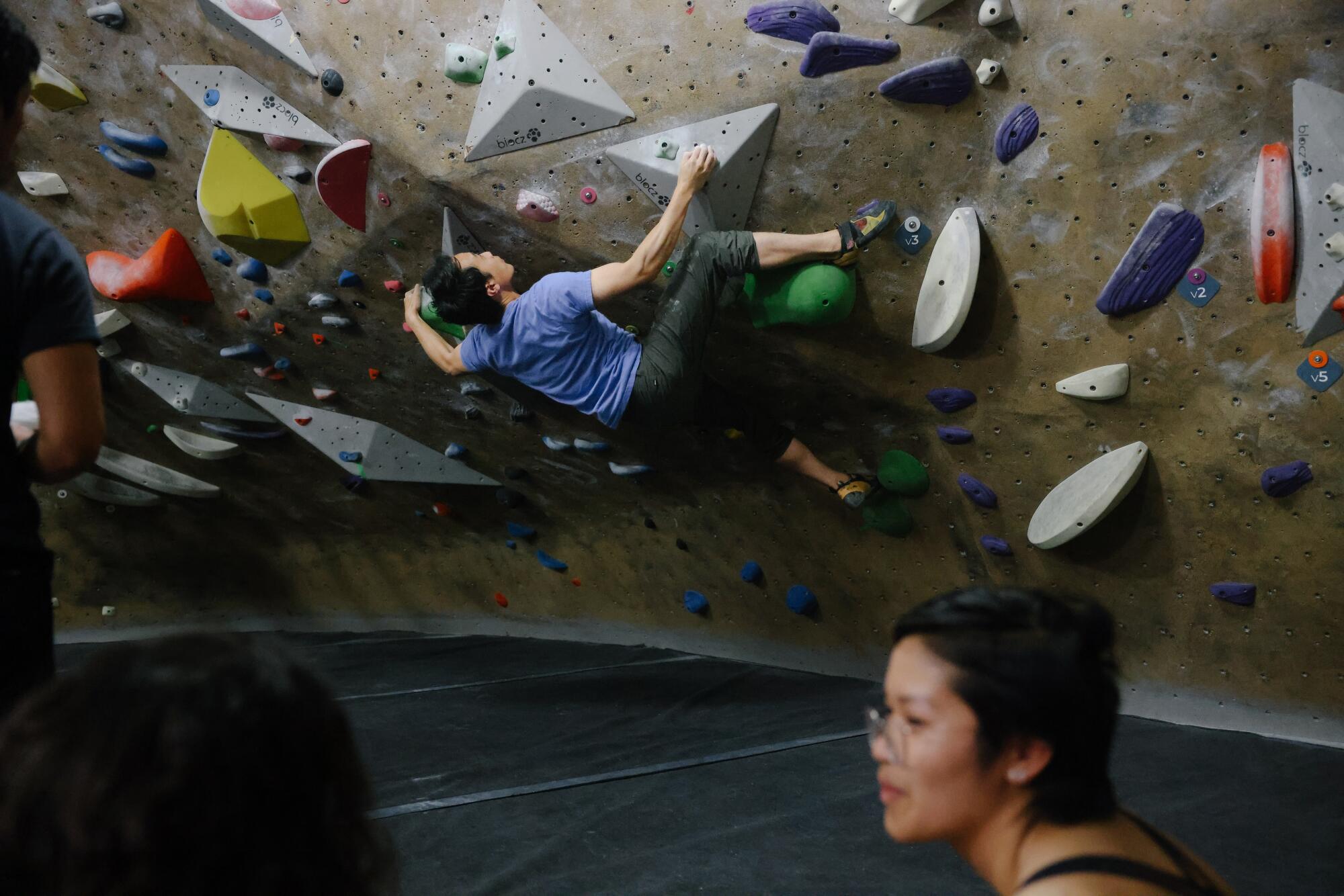
Calvin Wong climbs at a gymnasium close to his dwelling in San Mateo, Calif. The avid rock climber and baby of immigrants appreciates all his mother and father have finished for him.
(Dania Maxwell / Los Angeles Occasions)
A long time in the past, Yvonne requested her husband about transferring Calvin to the U.S. On the time, their son was 7 and already carrying half a dozen thick textbooks in his backpack. His mother and father knew the life forward in Hong Kong: lengthy days and nights of finding out for a do-or-die school entrance examination. Crushing stress. Conformity.
They went via that life. They needed one thing totally different for Calvin.
“It wasn’t a posh dialogue or dialog,” stated Johnny, 69. “She raised the purpose about his training, and I used to be like, ‘I help it 100%.’”
Life within the U.S. got here with sacrifices. Yvonne and Calvin moved to California. Johnny stayed behind to proceed his work as a administration advisor in Asia and deal with his mom.
Till Johnny semi-retired and got here to the U.S. seven years in the past, he noticed his son in particular person solely two or 3 times a 12 months for about two weeks at a time. He missed reminiscences that Calvin nonetheless holds expensive — just like the Halloween when he dressed up in a yellow Wolverine costume.
1
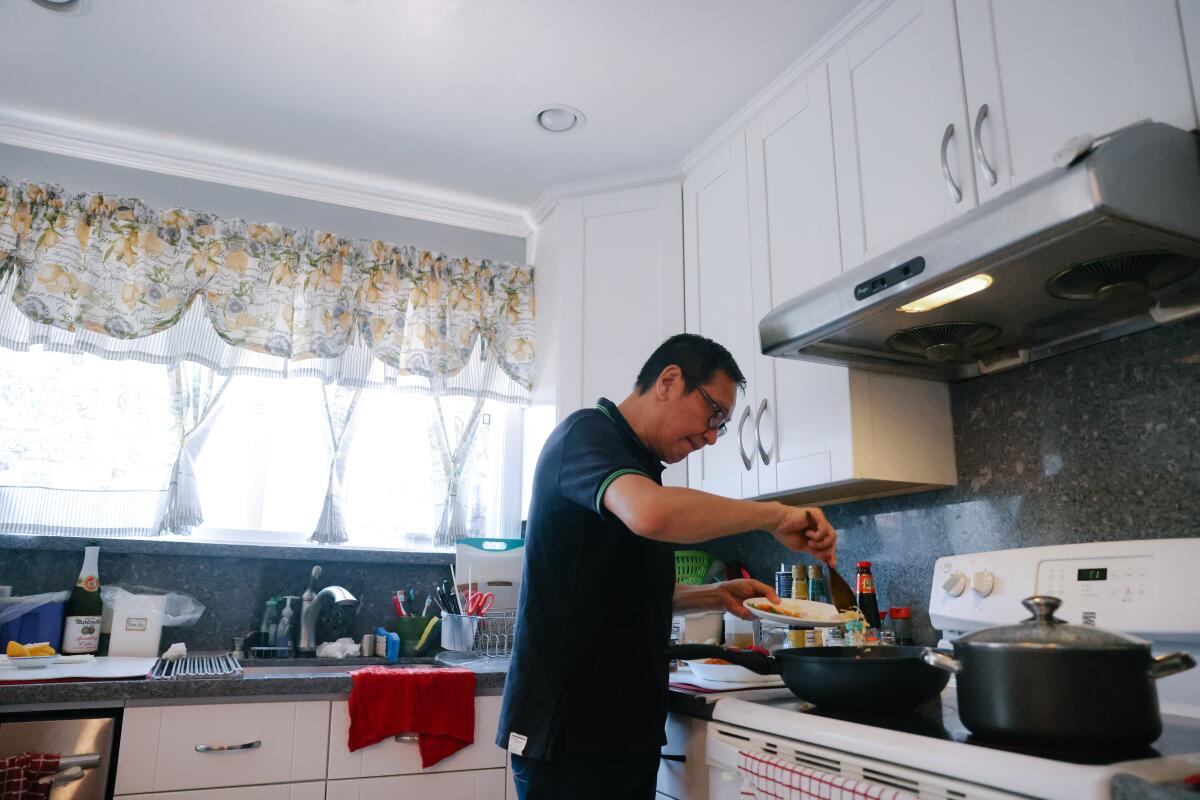
2

3

1. Johnny Wong prepares dinner at his dwelling in San Mateo, Calif. Wong stayed in China till seven years in the past whereas his spouse and son have been within the U.S. (Dania Maxwell / Los Angeles Occasions) 2. Yvonne Wong, enjoying badminton in San Mateo, stated of her life within the U.S.: “We aren’t wealthy, however we’ve a wealthy life. Life is straightforward, plentiful, joyful.” (Dania Maxwell / Los Angeles Occasions) 3. Calvin Wong sees an analogy between his life within the U.S. and mountain climbing: “In climbing, there are static actions the place you progress slowly to get to the following objective. There are dynamic actions the place you need to go for it — bounce and go someplace distant.” (Dania Maxwell / Los Angeles Occasions)
Yvonne missed her husband, however she too needed to alter. In Hong Kong, she had labored up the ladder to be an assistant department supervisor at a financial institution. She didn’t wish to take a junior place within the U.S. However she stated she realized seniority doesn’t matter as a lot within the U.S. so long as “you’re succesful.” She took the job.
Most working immigrants, 68% of these surveyed, stated they really feel they’ve the proper {qualifications} for his or her job, however a few quarter stated they really feel overqualified, having extra abilities and training than their job requires.
As Johnny ready lunch on a current afternoon for himself and Yvonne — pork spare ribs, soy sauce braised salmon, deviled egg salad and pan-fried shrimp — he stated he tried “to understand the great facet of in every single place.”
“If you’re at all times complaining, that’s not good,” he stated.
Yvonne stood subsequent to him, giving directions in Cantonese as she chopped bell peppers. An outdated Canto-pop ballad performed on an iPad.
Since absolutely retiring a 12 months in the past, Johnny finds pleasure in household mah-jongg periods on Saturday afternoons, common qigong courses at a park, gardening within the yard and studying the right way to prepare dinner Chinese language meals from Yvonne and myriad YouTube movies.
“We aren’t wealthy, however we’ve a wealthy life,” Yvonne stated. “Life is straightforward, plentiful, joyful.”
Calvin, who works because the senior director for the skilled companies agency Aon in San Francisco, stated he appreciates what his mother and father have finished for him.
He drew a parallel between his life and mountain climbing, a pastime he’s keen about.
“In climbing, there are static actions the place you progress slowly to get to the following objective,” he stated. “There are dynamic actions the place you need to go for it — bounce and go someplace distant.”
On a current morning, the solar hadn’t but risen when Barradas-Medel and her husband began their day.
Within the kitchen, Medel chopped tomatoes, jalapeno and onion for huevos rancheros. He didn’t have a panorama job till 9:30 a.m., however awoke early to make breakfast for the household as he does daily.
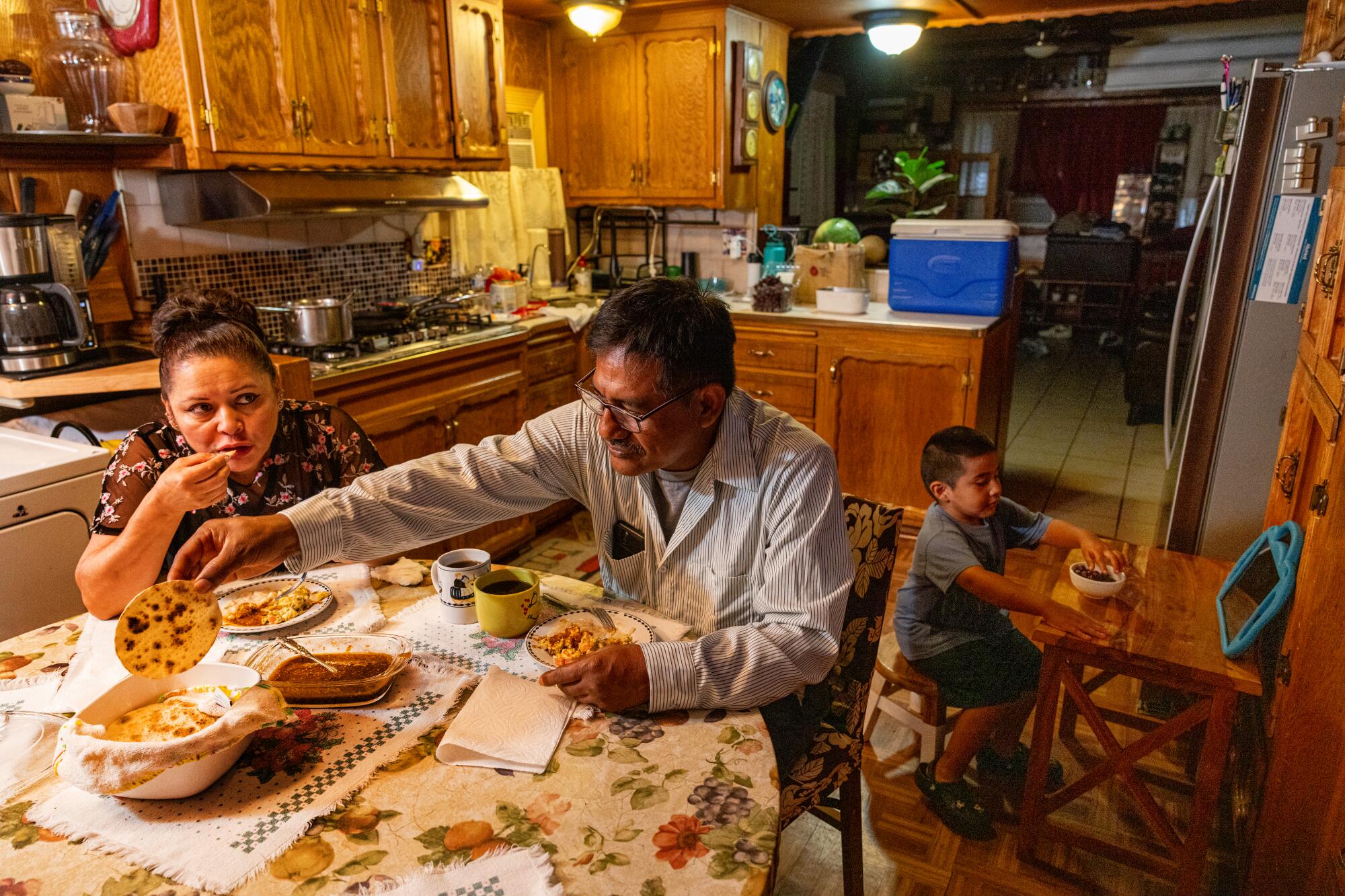
The Barradas-Medel household sits right down to breakfast of their one-bedroom cellular dwelling in Azusa. “I’d do it once more,” Maria Del Pilar Barradas-Medel stated of immigrating to the U.S.
(Irfan Khan / Los Angeles Occasions)
Hanging on a wall close to the kitchen was their daughter Alexa’s pencil-drawn portrait of a younger man, which helped her place within the 2022 Congressional Artwork Competitors. Barradas-Medel accompanied her to D.C. — Alexa’s first time on a aircraft — to simply accept the award. In the lounge, close to his mattress, Alexander had stacked containers of Nike and Adidas sneakers he purchased with the cash he saved working on the regulation agency together with his mom.
Barradas-Medel, who arrived in California in 1994, usually tells her youngsters that the lives they lead are a world away from the one she had in Mexico. There, she dropped out in center college to work as a maid to assist with payments. An older and a youthful sister additionally needed to drop out. Right here, Alexander obtained his affiliate’s diploma, and Alexa lately began neighborhood school and plans to switch to a college.

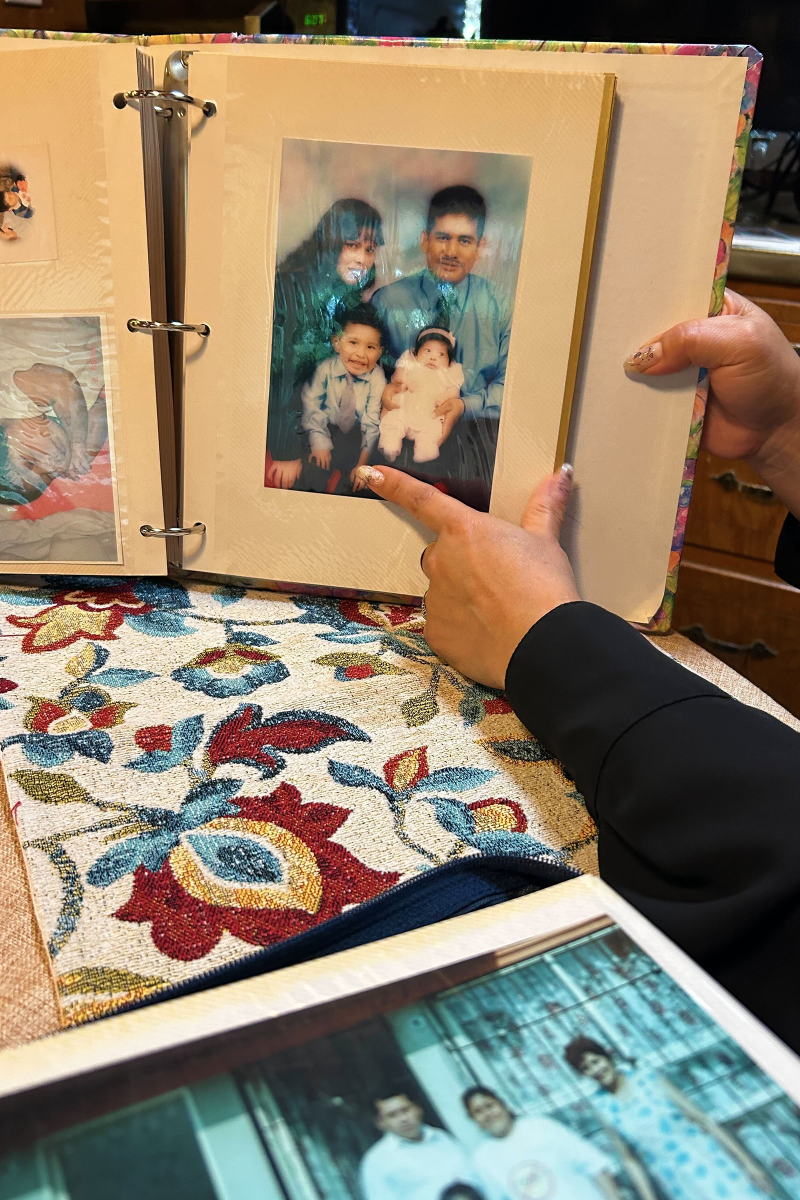
(Maria Del Pilar Barradas-Medel and Alejandro Medel)
“We’re at all times telling our children they should research,” Barradas-Medel stated. “They’re going to have a greater future finding out.”
As Medel cooked, Barradas-Medel, wearing slacks and a black shirt embroidered with a crimson rose, packed rooster and potato quesadillas, soup and salsa for herself and Alexander. Quickly, the 2 would head to the regulation agency, the place Barradas-Medel has labored for 11 years.
When Barradas-Medel was first employed, she had no expertise and wanted assist to activate the pc. Now, “she runs this workplace,” a paralegal stated throughout a current workday.
Barradas-Medel, who works within the archives, is likely one of the clerks answerable for sustaining case recordsdata. With each assembly and listening to, she updates the bodily and digital recordsdata so the legal professionals have every little thing they want.
By now, she is aware of the place all of the containers are saved for various circumstances, and she or he prepares bodily recordsdata weeks forward of scheduled courtroom hearings. Her small cubicle — embellished with photos that her 4-year-old son, Anxelo, coloured — is as effectively organized as her closet at dwelling.
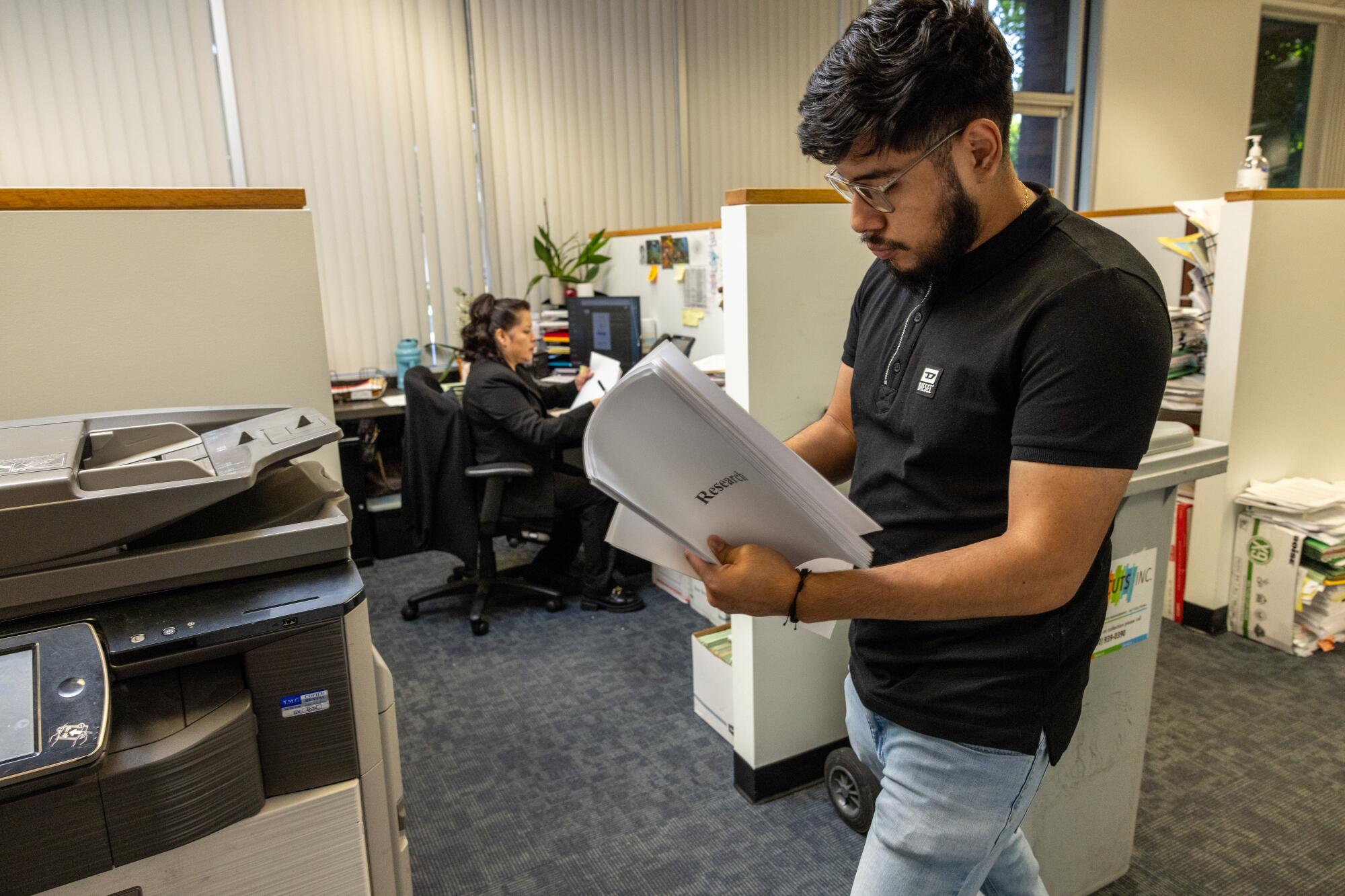
Maria Del Pilar Barradas-Medel and her son Alexander, 20, work within the regulation workplace in Arcadia the place she has been employed for 11 years.
(Irfan Khan / Los Angeles Occasions)
In Mexico, “I by no means would have been in a position to get right into a job like this one,” she says.
Her success has benefited members of the family on either side of the border.
When Barradas-Medel started sending a refund to Mexico — no less than $100 every month — she had her mother cease working as a maid. No extra of her siblings needed to drop out of college to assist pay the payments. Near half of all immigrants stated they ship cash to family members or pals of their nation of delivery no less than often.
Her older sister, Maria Del Consuelo, stated Barradas-Medel is somebody who “at all times seems to be out for the household.” She credit the monetary help as the rationale why her son is enrolled in a college.
“Pilar is an unconditional and distinctive help,” Maria Del Consuelo stated. “If she weren’t over there every little thing could be very totally different. Due to her and her effort, we’ve achieved quite a bit as a household.”
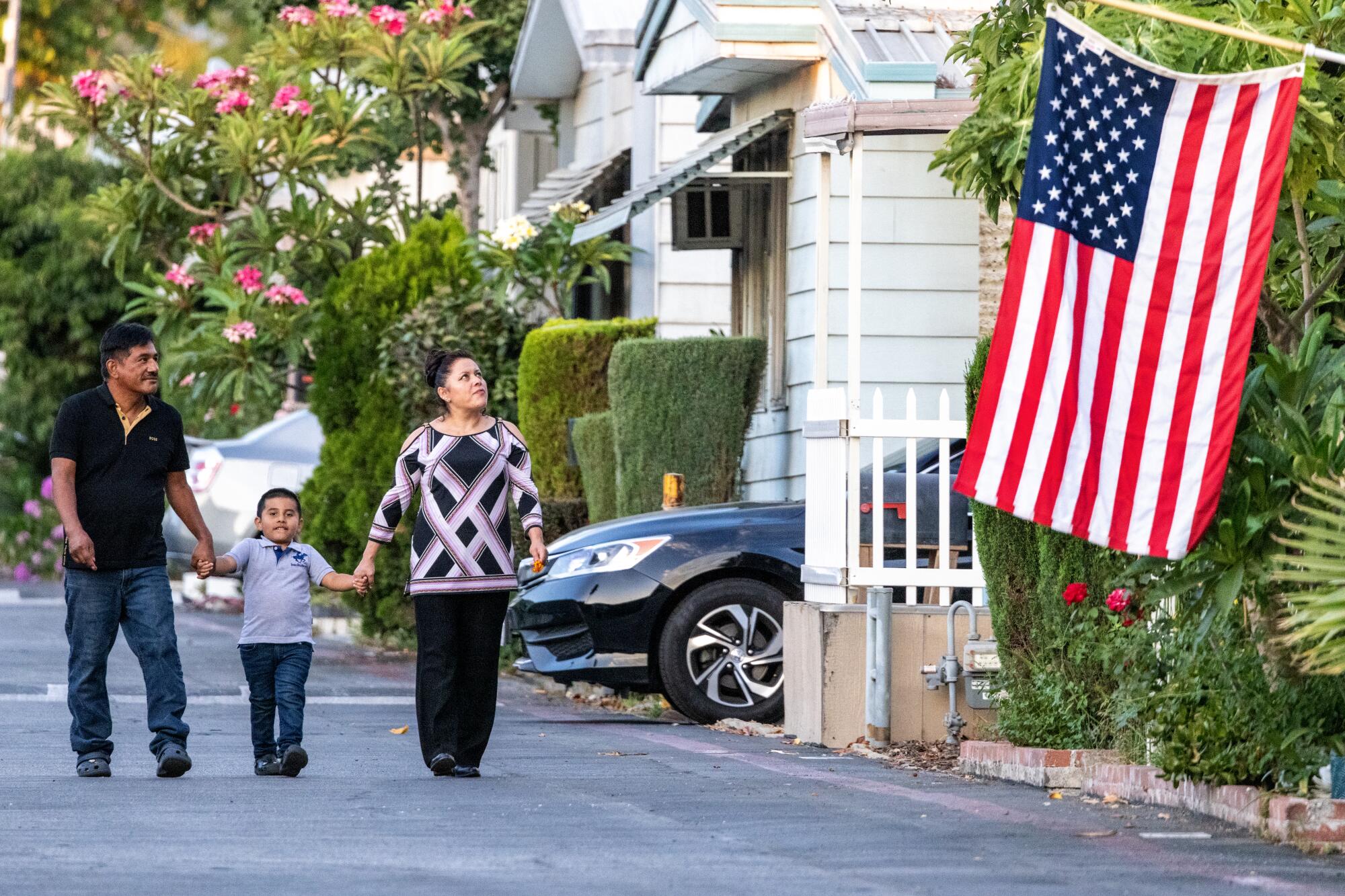
Maria Del Pilar Barradas-Medel and Alejandro Medel, with son Anxelo, are amongst a majority of immigrants who’re optimistic about this nation.
(Irfan Khan / Los Angeles Occasions)
Barradas-Medel, a naturally optimistic particular person, tries to stay by the decal painted on her nails: “Be joyful and smile”
In spite of everything, there’ll at all times be one thing to fret about. Rising inflation. The well-paying job Medel misplaced as a result of his longtime purchasers determined to maneuver. The bigger houses that stay out of their value vary.
However none of it may change Barradas-Medel’s thoughts in regards to the resolution to depart Mexico so a few years in the past.
“We haven’t achieved every little thing,” she stated, “however we’ve a greater life than we did in our nation.”
Occasions employees writers Tyrone Beason and Anh Do contributed to this report.








More Stories
Jeffrey Clark Seeks to Take away Fulton County Case to Federal Court docket
Alleged Napa trespasser stabs house owner. Home-owner stabs again
Italy cracks down on migrants, Meloni requires naval blockade off North Africa : NPR